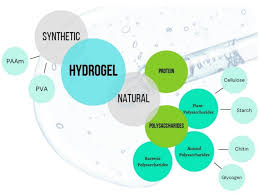
Benefits of the uses of Hydrogel in Sugacane Cultivation Publish Date : 20/10/2024
Benefits of the uses of Hydrogel in Sugacane Cultivation
Proff. R. S. Sengar
Hydrogel, a superabsorbent polymer, has several benefits in the cultivation of sugarcane:
Conservation of Water
Retains soil’s moisture: Hydrogel absorbs and retains water, reducing soil moisture losses.
Reduces irrigation frequency: Hydrogel releases water as per need, this minimizing requirement of irrigation.
Improves the Soil Health
Improves soil structure: Hydrogel enhances soil porosity, aeration and water penetration.
Increases nutrient availability: Hydrogel helps retain nutrients and reducing leaching and runoff.
Enhances Plant Growth
Enhances root development: Hydrogel promotes healthy root growth, increasing sugarcane yields.
Boosts plants vigor: Hydrogel reduces stress, promoting healthy plant growth.
Drought Tolerance
Protects sugarcane from drought: Hydrogel releases water during the drought, ensuring plant survival.
Reduces drought-related yield loss: Hydrogel helps maintain sugarcane yields despite water scarcity.
Environmental Benefits
Reduces water waste: Hydrogel minimizes water evaporation and runoff.
Decreases fertilizer usage: Hydrogel reduces nutrient leaching, minimizing environmental pollution.
Economic Benefits
Increases sugarcane yields: Hydrogel improves plant growth, leading to higher yields. As R nutrients near by the rhizosphere.
Reduces irrigation costs: Hydrogel minimizes irrigation frequency and saving water and the energy.
Extends crop cycle: Hydrogel helps sugarcane crops thrive in the challenging conditions.
Application Methods
Soil incorporation: Mix hydrogel with soil before planting.
Drip irrigation: Use hydrogel-infused water through drip irrigation systems.
Key Considerations
1. Choose the right hydrogel type and concentration.
2. Need to optimize application rates and timing.
3. Monitor soil moisture and adjust irrigation accordingly.
By incorporating hydrogel into sugarcane cultivation, farmers can improve water efficiency specially in summer, reduce costs, and increase yields, contributing to a more sustainable and profitable agricultural practice.
There is a need to conduct research trials in different locations to adopt on the coomercial scale.

Writer: Dr. R. S. Sengar, Director Training and Placement, Sardar VallabhBhai Patel University of Agreiculture and Technology, Modipuram, Meerut.


